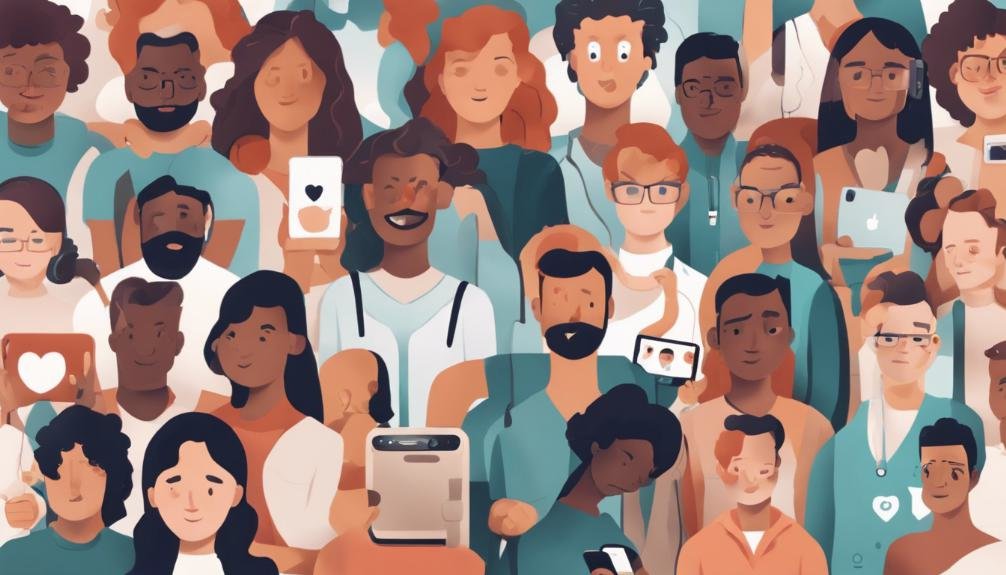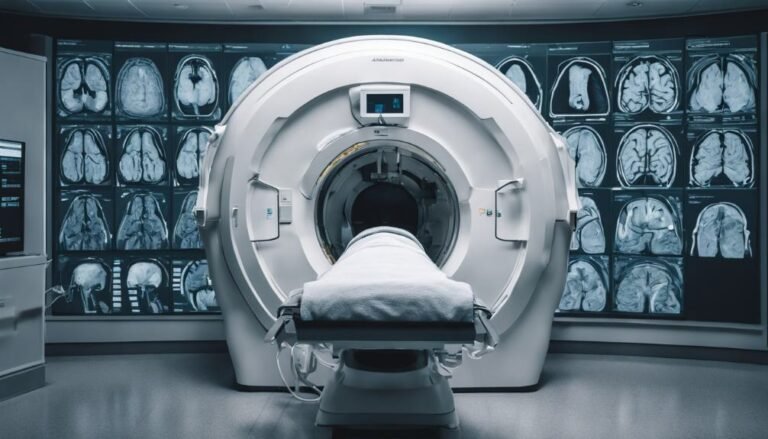AI in Mental Health Care
In the domain of mental health care, the integration of AI has sparked intriguing debates and discussions about its impact on the field. As AI algorithms become more sophisticated in deciphering patterns and predicting outcomes, the question of how this influences the human touch in therapy lingers. Balancing the precision of AI with the empathy and understanding that human therapists offer raises significant considerations for the future of mental health care. The evolving landscape of AI applications in this area opens up a dialogue on the delicate equilibrium between technological advancements and the deeply personal nature of mental health support.
Key Takeaways
- AI chatbots offer immediate emotional support.
- Personalized therapy plans enhance engagement.
- Remote monitoring enables proactive care.
- AI aids in early detection and intervention.
- Ethical considerations crucial for AI implementation.
The Role of AI in Mental Health
In the field of mental health, AI plays a crucial role in revolutionizing the way individuals receive care and support. AI chatbots provide a unique platform for individuals to express their emotions and receive immediate feedback, offering a sense of companionship and understanding. These chatbots can also offer coping mechanisms and strategies for managing stress and anxiety.
Remote monitoring through AI technology enables healthcare providers to keep track of patients' mental health status outside traditional clinical settings. This allows for early intervention and personalized care plans based on real-time data, enhancing the overall quality of care provided.
Moreover, virtual reality has emerged as a powerful tool for stress management in mental health treatment. By immersing individuals in relaxing and calming virtual environments, VR therapy can help reduce anxiety levels and improve overall well-being.
The integration of AI chatbots, remote monitoring, and virtual reality into mental health care showcases the potential for technology to enhance support systems and provide more accessible and effective treatments for individuals facing mental health challenges.
AI Applications in Therapy
With advancements in artificial intelligence, therapy practices are being transformed to provide more personalized and effective mental health care. Virtual counseling and chatbot therapy are two significant AI applications making waves in the field of therapy.
Virtual counseling allows individuals to access therapy remotely, breaking down barriers such as distance and time constraints. This form of therapy can be particularly beneficial for those with physical limitations or living in rural areas with limited access to mental health services.
Chatbot therapy, on the other hand, involves the use of AI-powered chatbots to provide users with therapeutic conversations and support. These chatbots are available 24/7 and can engage with individuals in real-time, offering a listening ear and providing coping strategies for managing mental health challenges.
While chatbot therapy isn't a replacement for traditional therapy, it can serve as a valuable supplement, especially for individuals who may be hesitant to seek in-person counseling. Both virtual counseling and chatbot therapy showcase the potential of AI in enhancing the accessibility and effectiveness of therapy, ultimately improving mental health outcomes for a broader range of individuals.
Personalized Treatment With AI
When it comes to mental health care, personalized treatment with AI can revolutionize the way therapy plans are tailored to individual needs. This approach offers a level of precision that was previously challenging to achieve. AI algorithms can analyze vast amounts of data to identify patterns and customize interventions that resonate with your unique circumstances, enhancing the effectiveness of your treatment.
Tailored Therapy Plans
Crafting tailored therapy plans with the assistance of AI technology allows for a more personalized approach to mental health treatment. Through therapy customization, AI can analyze vast amounts of data to create personalized interventions that cater specifically to your needs. This level of personalization not only enhances patient engagement but also increases treatment effectiveness by targeting your unique challenges and strengths.
By utilizing AI to tailor therapy plans, mental health professionals can better understand the intricacies of your condition and design interventions that align with your individual preferences and circumstances. This customized approach guarantees that the therapy you receive isn't only evidence-based but also tailored to suit your specific requirements, ultimately leading to more successful outcomes.
Moreover, the integration of AI in mental health care enables continuous monitoring and adjustment of therapy plans based on real-time data, ensuring that your treatment remains dynamic and responsive to your evolving needs. Embracing this innovative technology allows for a more efficient and effective therapeutic experience that's centered around your well-being and progress.
Precision in Care
Customizing therapy plans with the aid of AI technology guarantees precision in mental health care by delivering personalized treatment interventions that address your specific needs and challenges effectively. By utilizing data analytics, AI can analyze vast amounts of information regarding your symptoms, preferences, and responses to different interventions. This data-driven approach allows mental health professionals to tailor treatment plans that are uniquely suited to your individual circumstances.
The use of AI in precision care not only enhances the accuracy of diagnosis and treatment but also markedly improves patient outcomes. Through continuous monitoring and analysis of your progress, AI can adjust therapy plans in real-time to make certain that you receive the most effective interventions at every stage of your mental health journey. This personalized approach not only increases the likelihood of successful outcomes but also minimizes the risk of potential setbacks by adapting treatment strategies based on your specific needs.
Embracing AI in mental health care can lead to more targeted and efficient interventions, ultimately improving your overall well-being.
Ethical Considerations in AI Use
Given the potential impact on patient well-being and privacy, ethical considerations play a pivotal role in the use of AI in mental health care. When it comes to data privacy and patient consent, healthcare providers must guarantee that sensitive information is handled securely and that individuals have a clear understanding of how their data will be used.
Transparency in algorithms is equally vital. Bias in AI algorithms can inadvertently perpetuate disparities in mental health care, making it necessary to regularly assess and address any biases present in the technology being used.
Moreover, maintaining transparency in how these algorithms function can help build trust between patients and healthcare providers. It's crucial to involve patients in the decision-making process, ensuring they're informed about how AI is being utilized in their care.
Advantages of AI in Diagnosis
When it comes to mental health care, AI offers you early detection benefits by identifying patterns and subtle changes that may go unnoticed.
This precision in diagnosis can lead to tailored treatment plans that are more effective and efficient for your unique needs.
Early Detection Benefits
Discover the significant advantages that AI brings to the early detection of mental health conditions, revolutionizing the diagnosis process.
AI enables the implementation of prevention strategies and early intervention by identifying subtle patterns in behavior and speech that may indicate the onset of mental health disorders.
Through remote monitoring, AI can continuously analyze data collected from individuals, providing insights into changes that might go unnoticed in traditional assessments.
This proactive approach allows healthcare providers to intervene sooner, potentially preventing the escalation of symptoms and improving treatment outcomes.
Precision in Diagnosis
Utilizing artificial intelligence in mental health care enhances diagnostic precision by analyzing vast amounts of data to identify subtle patterns indicative of various mental health conditions. Machine learning algorithms can sift through extensive datasets with unprecedented speed and accuracy, leading to enhanced diagnostic accuracy in mental health disorders. This significance in diagnosis is vital for developing personalized treatment plans and implementing targeted interventions, a concept known as precision medicine in mental health diagnosis.
AI systems can detect patterns and trends in patient data that may elude human observation, enabling healthcare providers to make more informed and timely diagnostic decisions. By leveraging AI technology, clinicians can access a wealth of information to support their diagnostic assessments, ultimately improving patient outcomes.
The integration of AI in mental health diagnosis marks a significant advancement in healthcare, offering a promising avenue for achieving more accurate and efficient diagnostic processes. Embracing AI-driven precision in mental health diagnosis can lead to enhanced patient care and more effective treatment strategies tailored to individual needs.
Improved Treatment Planning
AI technology plays a crucial role in enhancing treatment planning in mental health care. By synthesizing diagnostic data, AI informs personalized and effective interventions. By analyzing vast amounts of patient information, AI assists clinicians in developing treatment plans tailored to individual needs. This personalized approach increases patient engagement by addressing their specific concerns and preferences, ultimately leading to improved treatment outcomes.
Through AI algorithms, treatment planning becomes more precise and evidence-based. AI can predict how different interventions may affect a patient based on their unique characteristics, making the planning process more efficient and accurate. This not only saves time but also enhances the quality of care provided to patients.
Moreover, AI can continuously monitor patient progress and adjust treatment plans accordingly. By analyzing real-time data, AI guarantees that interventions remain effective and relevant, promoting better treatment outcomes. This dynamic approach to treatment planning maximizes the chances of success and supports patients on their journey towards improved mental well-being.
Challenges of Implementing AI
Implementing AI in mental health care comes with a host of challenges that require careful consideration and planning. Two significant challenges that must be addressed are data privacy and implementation challenges. Ensuring the security and confidentiality of patient data is paramount when utilizing AI technologies in mental health care. It's vital to establish robust data protection protocols to safeguard sensitive information and maintain patient trust.
Moreover, overcoming implementation challenges such as integrating AI systems into existing healthcare infrastructures and workflows can be complex. It requires close collaboration between technology experts and mental health professionals to ensure seamless integration and best utilization of AI tools.
In addition to these challenges, addressing stigma reduction and promoting patient engagement are essential for the successful implementation of AI in mental health care. By actively involving patients in the development and use of AI technologies, healthcare providers can enhance the effectiveness and acceptance of these innovative solutions.
Embracing these challenges with a proactive and patient-centered approach is key to harnessing the full potential of AI in mental health care.
Future Trends in AI Development
To stay ahead in the evolving landscape of mental health care, it's important to look towards future trends in the development of artificial intelligence. AI integration in mental health services is poised to revolutionize patient outcomes by providing personalized and timely interventions. Future advancements in AI are expected to enhance therapy effectiveness by offering tailored treatment plans based on individual needs and real-time data analysis.
One key trend on the horizon is the utilization of AI algorithms to predict mental health crises before they occur, allowing for proactive interventions and improved patient outcomes. Additionally, AI is likely to play a significant role in expanding access to mental health services through virtual therapy platforms and chatbot interventions.
As AI continues to evolve, it's essential for mental health practitioners to stay informed and adapt to these technological developments. Embracing AI integration in mental health care can lead to more efficient treatment delivery, better outcomes for patients, and a more sustainable healthcare system overall.
Conclusion
To sum up, AI in mental health care is revolutionizing the way individuals receive support and treatment, offering innovative solutions to address emotional well-being.
Embracing the power of AI opens up new possibilities for personalized therapy, early detection of conditions, and continuous monitoring.
While challenges exist, the future of mental health care looks brighter with the integration of AI technology. It's time to welcome this groundbreaking advancement in support of mental health.







